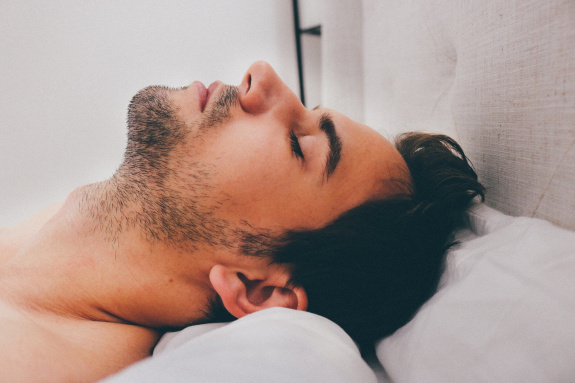Q&A: What Sleep Position Stops Snoring
Snoring
What is snoring?
Snoring is the noise that you make while you're sleeping due to the vibration of the tissues of your respiratory structures such as mouth, nose, and throat because of obstructed airways.
Why do we snore?
The airways through your nose and throat during sleep is partially blocked by the tissues of your respiratory structures.
What are the effects of snoring?
Snoring is harmless. But if you are snoring frequently and/or loudly, it could be caused by an underlying health problem. Here are some health problems associated with snoring:
- Insomnia/Sleep apnea/Other sleep disorders/Excessive daytime sleepiness
- Mental issues/Brain damage
- Emotional problems/Depression
- Aging
- Diabetes
- Increased rate of tumor and cancer cells growth
- Weight gain
- Cardiovascular diseases such as heart disease, blood pressure, and stroke
In a nutshell, snoring obstructs airflow into your body especially your brain. Your brain is your body's central command system and if it is not getting consistent and sufficient oxygen, it won't be able to support several body functions and will later result in several health problems.
What are the causes of snoring?
- Family history
- Age (we snore more as we age)
- Overeating/Lack of exercise (causes an increased fat around the throat)
- Alcohol/Sleeping pills (causes the muscles to relax)
- Smoking (cigarette causes irritation and swelling of nasal cavity and throat)
- Allergy (Respiratory allergies caused by dust particles, pet hair, mites, bedding, flowers, perfumes and other smell results into the narrowing of airways)
- Nasal stuffiness
- Anatomical abnormalities of the nose and throat that results in narrowing of airways (small or collapsing nostrils, poor muscle tone in the throat and tongue (collapsed or relaxed muscles around these areas), bulky throat tissue, long soft palate (roof of the mouth) and/or uvula
- Multifactoral snoring (caused by one or more of the causes mentioned above)
- Sleep Apnea
What is sleep apnea and how is it related to snoring?
Sleep apnea is when breathing is disrupted for a few seconds or minutes while you're sleeping increasing the risk of developing cardiovascular diseases, brain damage, and other serious health conditions. This happens when the airway is completely obstructed resulting to long pauses in breathing.
What are the symptoms of sleep apnea?
- Frequent, very loud snoring with longer pauses followed by choking
- Lack of energy even after full night's sleep
- Restless sleep or sleepiness during daytime
- Headaches in the morning
- Decreased libido
- Mood changes
- Increased risk of traffic accidents
- Cardiovascular disease
- Weight gain
- Change in the level of attention, concentration or memory
- Impotence
Solutions to Snoring
How to diagnose your snoring?
- Tongue-based (closed mouth) - The tongue falls into the back of the throat blocking the airway vibrating at the base of the tongue causing less harsh sound. This is the case for OSA (Obstructive sleep apnea)
- Mouth-based (open mouth) - This is when you breathe through your mouth during sleep rather than your nose. Nose-based - This is caused by nasal collapse or congestion.
- Throat-based (palatal flutter) - This is caused by vibration of the soft tissue in your throat (palate and uvula) which gives off a rough sound.
- Snoring from any position
What are the solutions for snoring?
You'll probably have to try out each solution to determine which would work best for you. In most cases, you'll need to use one or more of the solutions listed below to lessen snoring. Keep in mind though that these solutions may not completely resolve snoring but might at least lessen the frequency and loudness of snoring.
Bedtime remedies
*Humidify your bedroom (dry air reduces the amount of air that can pass through your respiratory structures).
*Check if the medicine has "snoring" as a side effect.
*Avoid sleeping pills.
*Stay well hydrated.
*Do simple mouth and throat exercises like singing.
*Change your pillows due to allergens.
*Practice good sleep hygiene.
Open nasal passages (allows air to move slower preventing snoring)
*Resolve nasal congestion with decongestion or antihistamine.
*Take a hot shower (moistens the breathing channels).
*Rinse or Neti pot with salt-water solution
*Nasal strips (lifts your nostrils)
*Speak with a doctor about sinus infections
Lifestyle changes
*Avoid alcohol (alcohol is a muscle relaxant)
*Lose weight (gaining weight around your neck narrows your respiratory airways)
Anti-snoring aids or treatments
*OTC sprays and pills
*Chinstrap
*Anti-snoring mouthpiece
*Mandibular advancement device (MAD) for tongue-based snoring
*Expiratory positive airway pressure (EPAP) valves for nostrils
*Continuous positive airway pressure (CPAP) is a most common treatment for sleep apnea (involves wearing mask where air pressure is constant and adjusted)
*Surgery
How does sleeping position impact snoring?
On your back: This leads to snoring because when sleeping on our backs, our tongue and soft palate have the tendency to fall back into the throat narrowing the airway leading to breathing abnormalities. Advice: Recline the bed with the head up and extended to open nasal airway passages. Note: Using very thick pillow may cause head or neck pain.
On your side: Body pillows enable you to sleep on your side or use any soft object to prevent yourself from sleeping on your back. Studies show that this sleeping position has the most health benefits.
On your stomach: Studies show that this is good for digestion and also reduces snoring. Advice: Don't put a pillow on your face to avoid neck and back issues.
Fetal position: Is also good for snorers since it is similar to sleeping on your side.

